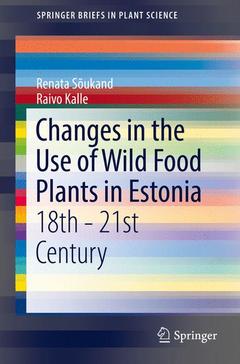Changes in the Use of Wild Food Plants in Estonia, 1st ed. 2016 18th - 21st Century SpringerBriefs in Plant Science Series
Auteurs : Sõukand Renata, Kalle Raivo

1. Introduction.
2. What Is Wild Food Plant.
3. Estonia in the Context of Wild Food Plants.
4. The Sources and Methods Used in the Book.
5. Use of Wild Food Plants.
6. Sources That Influenced the Use of Wild Food Plants in Estonia.
7. Recent Changes in Use of and Perceptions on Wild Food Plants in Saaremaa.
8. Conclusions and Future Perspectives.
Renata Sõukand, PhD is a researcher at the Estonian Literary Museum in Tartu, Estonia. Dr. Sõukand defended her PhD thesis on the historical perception of herbal landscapes in Semiotics and Cultural Theory at the University of Tartu in 2010. She won a 2016 European Research Council Starting Grant for her project "Ethnobotany of divided generations." Her main research interests are the popular perceptions and changes in plant use, the conceptualization of wild food and medicinal plants, herbal ethnomedicine and ethnocuisine, and the food-medicine continuum of the past and present. Starting from archival research and interpretation of folklore records, she moved on to research the popular use of wild food plants through contemporary surveys and sample field research all over Estonia and later conducted intensive fieldwork on Saaremaa Island on the use of wild food plants and ethnomedicine. Dr. Sõukand’s experience extends beyond Estonia; she also has fieldwork experience in Ukraine, Belarus, and Kosovo. She has co-authored over 40 peer-reviewed publications and a book on popular use of wild edible plants, written in Estonian.
Raivo Kalle, MSc is a PhD student in botany at the University of Life Sciences, Tartu, Estonia. Since 2006 he has worked as a research assistant at the Estonian Literary Museum, digitizing and systematizing Estonian herbal lore. His main research interests are the use of wild food plants, especially changes in their use in Estonia through the last two centuries, use of alien plants in ethnomedicine, popular perceptions of changes in landscape and ecology, and history of ethnobotany in Estonia. Besides working in archives, he has intensive fieldwork experience all over Estonia, particularly on Saaremaa Island, in which he also adopted a survey on the use of wild edible plants to Estonian conditions. In addition, he conducted ethnobotanial fieldwork in Belarus and documented Estonian vegetation on a botanical expedit
Combines historical and modern wild food plant research, a feature very rarely published, but also concentrates on quantitative aspects of the modern plant use
Covers the use of wild food plants; the vegetation used overlaps greatly with the vegetation available in other regions with similar natural conditions
Contains a full list of the plants used in Estonia with qualitative data
Date de parution : 11-2016
Ouvrage de 172 p.
15.5x23.5 cm
Disponible chez l'éditeur (délai d'approvisionnement : 15 jours).
Prix indicatif 52,74 €
Ajouter au panier


